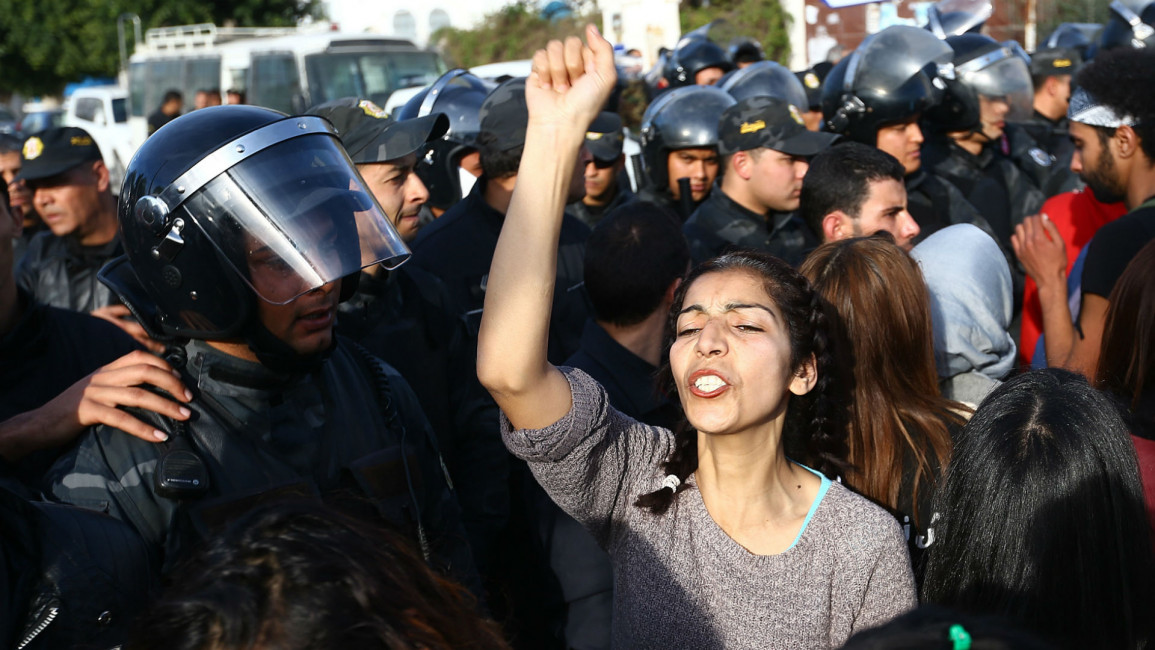Protesters and police clash in Tunisia mining basin
Protesters and police clash in Tunisia mining basin
Tunisian police clashed with protesters who demanded that a portion of revenues produced from mining in the area be allocated to development.
2 min read
Tunisia has experienced a wave of demonstrations protesting economic conditions in the country (Getty)
Tunisian police used tear gas on Sunday to disperse dozens of protesters demanding jobs and development in a mining town in the centre of the country, an AFP correspondent said.
"Work, freedom, national dignity," protesters chanted in Mdhilla, demanding that a portion of revenues produced from phosphate mining in the region be allocated to its development.
Tensions began on Friday following a ministerial meeting aimed at finding solutions to the mining basin's economic crisis.
On Saturday night, police fired tear gas at protesters who tried to block trains that were transporting phosphate.
Sunday's protest, attended by many young men and women, broke down into clashes after some demonstrators threw stones at police, who again used tear gas to disperse the crowd.
Although rich in phosphate - which is used to make fertilisers - Tunisia's mining basin is one of the poorest regions in the country, and social unrest is common.
Phosphate production, a key sector of the Tunisian economy, resumed earlier this month after protests blocked exports at mines for nearly six weeks.
Friday's ministerial meeting in Tunisia's Gafsa region, attended by Finance Minister Ridha Chalghoum, came in response to accusations by residents that the state was "absent".
But the measures announced at the end of the meeting, including the construction of a power station, were deemed insufficient by protesters, who reacted with road blocks.
The Gafsa Phosphate Company (GPC) is one of the world's leading phosphate producers. Its chief mines are in the towns of Metlaoui, Redeyef, Om Laarayes and Mdhilla.
The mining basin was the theatre of a 2008 insurrection brutally put down by former dictator Zine El Abidine Ben Ali.
"Work, freedom, national dignity," protesters chanted in Mdhilla, demanding that a portion of revenues produced from phosphate mining in the region be allocated to its development.
Tensions began on Friday following a ministerial meeting aimed at finding solutions to the mining basin's economic crisis.
On Saturday night, police fired tear gas at protesters who tried to block trains that were transporting phosphate.
Sunday's protest, attended by many young men and women, broke down into clashes after some demonstrators threw stones at police, who again used tear gas to disperse the crowd.
Although rich in phosphate - which is used to make fertilisers - Tunisia's mining basin is one of the poorest regions in the country, and social unrest is common.
Phosphate production, a key sector of the Tunisian economy, resumed earlier this month after protests blocked exports at mines for nearly six weeks.
Friday's ministerial meeting in Tunisia's Gafsa region, attended by Finance Minister Ridha Chalghoum, came in response to accusations by residents that the state was "absent".
But the measures announced at the end of the meeting, including the construction of a power station, were deemed insufficient by protesters, who reacted with road blocks.
The Gafsa Phosphate Company (GPC) is one of the world's leading phosphate producers. Its chief mines are in the towns of Metlaoui, Redeyef, Om Laarayes and Mdhilla.
The mining basin was the theatre of a 2008 insurrection brutally put down by former dictator Zine El Abidine Ben Ali.


![Tourists and expatriates will be able to visit all Gulf countries with the same visa [Getty]](/sites/default/files/styles/image_212x120/public/2024-05/GettyImages-2063140119.jpg?h=199d8c1f&itok=Lm9EP8Z9)
